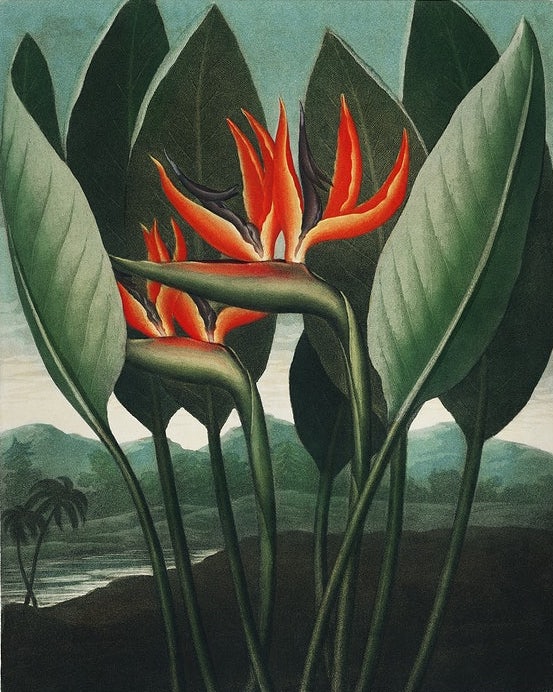
We heard no sound
except the wind
but she listened,
said the demon bid her plant.
So she bent low to sow seeds
in the red earth,
lentils and marigolds and lemons,
a wild confusion we knew
would never grow in clay.
Months later, her crops
loomed lush, bursting
into blooms of purple globes
huge as lanterns,
no relation to the seeds
she’d buried.
The plants bore fruits
we were afraid to taste
but she ate heartily.
None poisoned her.
She told us most were sweet,
and even the sourest
filled and fulfilled her.
The demon said, Read,
so she pored over the wallpaper
in her grandmother’s old rooms,
the sweet peas’ curled fists of pink and violet,
the kitchen’s cheerful cups and teapots,
the parlors’ somber stripes
and fulsome cabbage roses.
They yielded epics, thrilling tales,
and tragedies that made her weep so hard
her eyes were red for days.
We peered and peered
and saw nothing.
One day she herself ripened,
swelling with the demon’s child.
Twelve months she grew and grew,
rounder than a pumpkin.
When her time came,
the demon served as midwife,
wiping the sweat from her brow,
bidding her push.
He shooed us away,
told us she was his to care for.
Demon was our word, not hers,
and some of us wondered
if we’d got it wrong,
but when he took away the child
we figured we’d been right all along.
She told us she didn’t worry;
he’d care for her son
in the demon’s own world
among the demon’s folk.
Sometimes, though, we caught her crying,
clasping her empty arms.
But the demon said, Sing,
so she sang.
And the purple demonsblooms sang, too.
Long after midnight we’d hear
them chorus,
voices almost human,
with the sound of distant bells beneath them.
She sang, and she planted,
and she kept the demon closer
than she kept any of us.
Age came to her slower than most,
with fewer aches.
When she took to her bed at last,
the demon came to croon and fuss.
I never knew your name
nor cared, till now, she said.
Won’t you tell me?
The demon leaned close and with a kiss,
gave it, a name her lips would never form.
She clutched his hands
until her pulse ran out.
The demon’s grief was a roar
worse than a bear’s or a thunder storm’s
and then a scream like a butchered mare’s,
and then silence.
He rocked her in his arms
and none of us crept close enough
to see if he shed tears
and, if he did, what color they came out.
And when he’d spent his grief
he left her to us
with a nod, the first time
he’d ever acknowledged us.
The demonsblooms quired her name,
a thousand times her name.
They’re singing still
their requiems floating
over the house the demon
will never re-visit
and down our chimneys
like winter chill.
And which of us would scythe those stalks?
Which of us sneaks nightly
to her untended fields
to breathe the heady sour-sweet scent
of demonsblooms even as beneath our feet
the soil trembles to their dirge?
Which of us steals seeds
from the dusk-hued globes
and plants them in our own acreage,
hoping to taste such fruit,
wishing our passing’s marked
with such strange lamentations?




